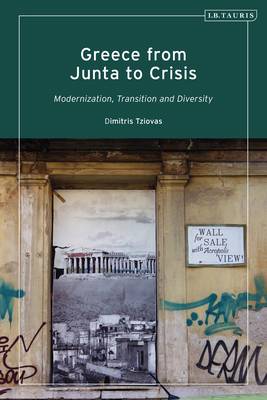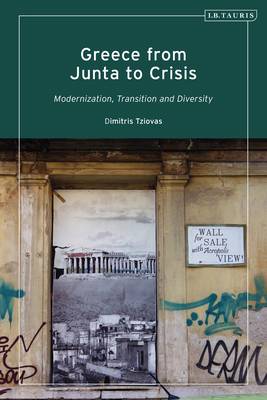
- Afhalen na 1 uur in een winkel met voorraad
- Gratis thuislevering in België vanaf € 30
- Ruim aanbod met 7 miljoen producten
- Afhalen na 1 uur in een winkel met voorraad
- Gratis thuislevering in België vanaf € 30
- Ruim aanbod met 7 miljoen producten
Zoeken
Greece from Junta to Crisis
Modernization, Transition and Diversity
Dimitris Tziovas
Hardcover | Engels
€ 125,95
+ 251 punten
Uitvoering
Omschrijving
The recent economic crisis in Greece has triggered national self-reflection and prompted a re-examination of the political and cultural developments in the country since 1974. While many other books have investigated the politics and economics of this transition, this study turns its attention to the cultural aspects of post-dictatorship Greece. By problematizing the notion of modernization, it analyzes socio-cultural trends in the years between the fall of the junta and the economic crisis, highlighting the growing diversity and cultural ambivalence of Greek society.
With its focus on issues such as identity, antiquity, religion, language, literature, media, cinema, youth, gender and sexuality, this study is one of the first to examine cultural trends in Greece over the last fifty years. Aiming for a more nuanced understanding of recent history, the study offers a fresh perspective on current problems.Specificaties
Betrokkenen
- Auteur(s):
- Uitgeverij:
Inhoud
- Aantal bladzijden:
- 320
- Taal:
- Engels
Eigenschappen
- Productcode (EAN):
- 9780755617449
- Verschijningsdatum:
- 15/07/2021
- Uitvoering:
- Hardcover
- Formaat:
- Genaaid
- Afmetingen:
- 156 mm x 234 mm
- Gewicht:
- 621 g

Alleen bij Standaard Boekhandel
+ 251 punten op je klantenkaart van Standaard Boekhandel
Beoordelingen
We publiceren alleen reviews die voldoen aan de voorwaarden voor reviews. Bekijk onze voorwaarden voor reviews.











